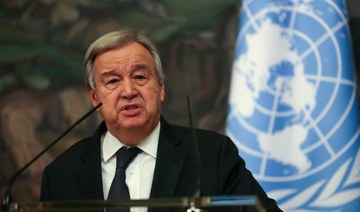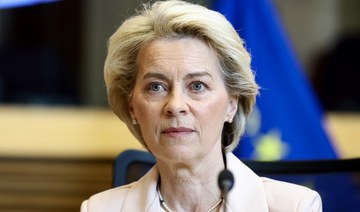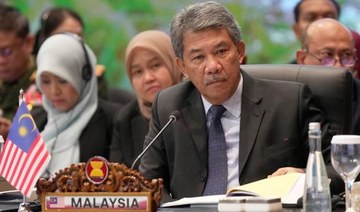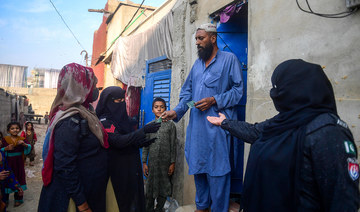WASHINGTON: Russia and the United States have carried out an unexpected prisoner exchange in a time of high tensions, trading on Wednesday a Marine veteran jailed by Moscow for a convicted Russian drug trafficker serving a long prison sentence in America.
The deal involving Trevor Reed, an American imprisoned for nearly three years, would have been a notable diplomatic maneuver even in times of peace but it was all the more surprising because it was done as Russia’s war with Ukraine has driven relations with the US to their lowest point in decades.
On the other end of the swap was Konstantin Yaroshenko, a Russian pilot who’d been serving a 20-year federal sentence for conspiring to smuggle cocaine into the US
Even as the Biden administration trumpeted the swap, it made clear the resolution did not herald a broader breakthrough between the countries. Russian forces remain determined in their assault on Ukraine, the US and Western allies continue to impose punishing sanctions and other Americans, including WNBA star Brittney Griner and Michigan corporate security executive Paul Whelan, still remain jailed in Russia.
The swap, the culmination of longstanding requests by both countries as well as private diplomatic wrangling, took place in Turkey when “the two planes pulled up side by side, essentially, and then they got out,” said Reed’s father, Joey.
“I think it’s going to really hit home for him and for us when we finally get to see him and touch him,” he said in an interview with The Associated Press.
Reed, a 30-year-old former Marine from Texas, was arrested in the summer of 2019 after Russian authorities said he assaulted an officer while being driven by police to a police station following a night of heavy drinking. He was later sentenced to nine years in prison, though the US government has described him as unjustly detained and pressed for his release while his family has asserted his innocence and expressed concerns about his deteriorating health — which included coughing up blood and a hunger strike.
Even on Wednesday, his parents’ joy was mitigated by the concern they said they felt about his physical appearance. They were struck by his unsteady gait and how thin he looked as TV footage captured him walking, flanked by guards, from a van to the jet.
“He just didn’t sound like himself,” said Reed’s mother, Paula, recounting their brief phone conversation while he was on the plane. “We just asked him how he was doing and he said, ‘I’m fine.’ But he always says that even when he isn’t. And he just didn’t sound like his normal self.”
Reed was en route back to the US, traveling with Roger Cartsens, the US government’s special presidential envoy for hostage affairs.
President Joe Biden, who met in Washington with Reed’s parents last month, hailed Reed’s release and noted without elaboration that “the negotiations that allowed us to bring Trevor home required difficult decisions that I do not take lightly.” The Russian government also confirmed the deal, with the foreign ministry describing the exchange as the “result of a long negotiation process.”
A senior Biden administration official cautioned that the negotiations centered on a “discrete set of prisoner issues” and did not represent a change to the US government’s condemnation of Russia’s violence against Ukraine.
“Where we can have discussions on issues of mutual interest we will try to talk to the Russians and have a constructive conversation without any way changing our approach to the appalling violence in Ukraine,” the official told reporters, speaking on condition of anonymity under ground rules set by the administration.
Yaroshenko, for his part, was arrested in Liberia in 2010 and extradited to the USon drug trafficking charges. The Justice Department has described him as “an experienced international drug trafficker” who conspired to distribute thousands of kilograms of cocaine around the world.
A lawyer for Yaroshenko, who in 2020 unsuccessfully sought to have his client freed on compassionate release because of the coronavirus pandemic, did not return an email seeking comment Wednesday.
Russia had sought Yaroshenko’s return for years while also rejecting entreaties by high-level US officials to release Reed, who was approaching his 1,000th day in custody after being convicted on what one US official, Ambassador John Sullivan, decried as “laughable” evidence.
The prisoner swap was the most prominent release during the Biden administration of an American deemed wrongly detained abroad and came even as families of detainees who have met over the last year with administration officials had described the officials as cool to the idea of an exchange.
The US government does not typically embrace such exchanges. It fears doing so might encourage foreign governments to take additional Americans as prisoners as a way to extract concessions. And it is concerned about a potential false equivalency between an unjustly detained American — which US officials believe Reed was — and a properly convicted criminal.
In this case, though, the US decided the deal made sense in part because Yaroshenko had already served a long portion of his prison sentence, which has now been commuted, a senior official told the AP on condition of anonymity.
In a statement, the Reed family thanked Biden, “for making the decision to bring Trevor home,” other administration officials, and Bill Richardson, former US ambassador to the United Nations. The family said Richardson traveled to Moscow in the hours before the Ukraine war began in hopes of securing Reed’s release.
Reed’s release had no immediate impact on the cases of other Americans held by Russia. Griner, for one, was detained in February after Russian authorities said a search of her bag revealed vape cartridges containing oil derived from cannabis. Whelan is being held on espionage-related charges his family says are bogus.
Biden said Wednesday “we won’t stop until Paul Whelan and others join Trevor in the loving arms of family and friends.” US officials have described Whelan as unjustly detained but as yet have not characterized Griner’s case in those terms. Whelan was convicted and sentenced to 16 years in prison; Griner is awaiting trial.
At home in Texas, the Reeds had been given a general sense of progress and had even begun cleaning Trevor’s room in preparation for his return home, removing paperwork from his bed so he’d have a place to sleep.
It was a welcome turnabout from a month ago when they were demonstrating outside the White House for their son’s release, then pressing their case in a private meeting with Biden.
“We’ve been saying for over a year if we could just speak to the president, that we felt like we could make this thing happen — and that’s exactly what happened,” Joey Reed said.
Russia releases US Marine vet in surprise prisoner exchange
https://arab.news/6q7hf
Russia releases US Marine vet in surprise prisoner exchange
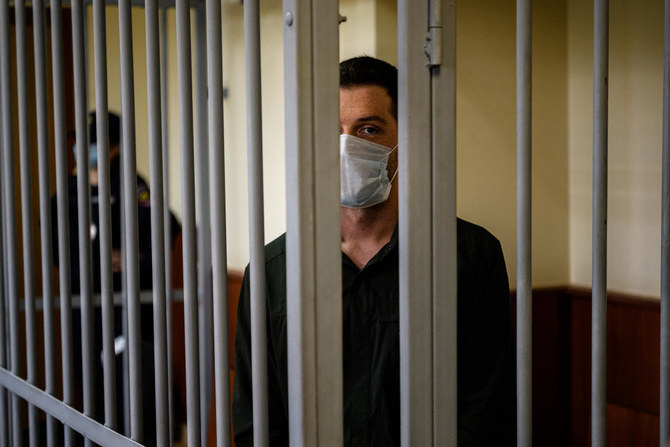
- Reed was arrested in the summer of 2019 after Russian authorities said he assaulted an officer while being driven by police to a police station following a night of heavy drinking
- The US government does not typically embrace such exchanges
Indonesian coffee takes lead in Egyptian market
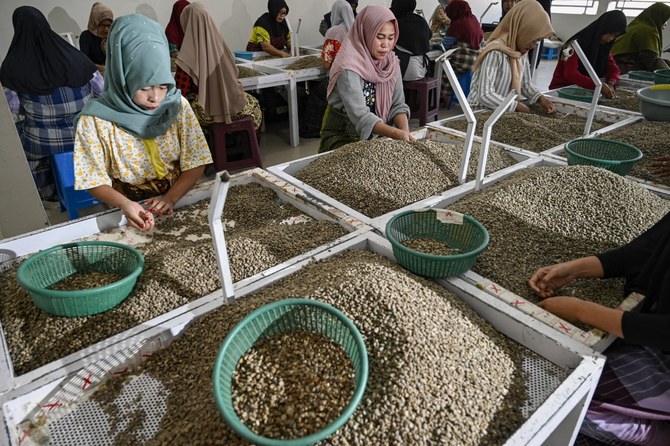
- Indonesia is the world’s 4th-largest coffee producer and Asia’s second-biggest
- Egypt was second-biggest export destination for Indonesian coffee in 2023, behind the US
JAKARTA: Indonesia has become Egypt’s main source of coffee, authorities said on Tuesday, as annual exports reached nearly $93 million, or about 43 percent of the market.
Indonesia is the world’s fourth-largest coffee producer and Asia’s second-biggest. In 2023, the Southeast Asian nation exported around 276,000 metric tons of the commodity worth almost $916 million, according to the Central Statistics Agency.
Egypt was the second-biggest export destination for Indonesian coffee, just behind the US, accounting for about 5.2 percent of the country’s total coffee exports.
“Indonesian coffee has successfully dominated the Egyptian market. Total export value reached $92.96 million, making Indonesia the biggest coffee-exporting country to Egypt in 2023,” Indonesian Ambassador in Cairo Lutfi Rauf said in a statement.
“This shows how Indonesian coffee products are loved by Egyptian consumers. The unique aroma and flavor are the main factors attracting consumers from Egypt.”
Indonesian officials held an annual meeting with Egyptian coffee buyers in Damanhour over the weekend, as they seek to foster good trade relations.
“We hope to continue and to improve trade relations. If there are any challenges, everything can be discussed well for the prosperity and welfare of the people of both countries,” Rauf said.
Indonesian officials have been increasing trade engagement with Egypt as a gateway for exports to other African countries in recent years, while Indonesian coffee producers are seeking to further their exports to the Middle East amid rising interest from the region.
Hariyanto, a coffee exporter from East Java province, said promotion efforts by the Indonesian Embassy in Cairo have helped boost the popularity of Indonesian coffee in Egypt.
“Egypt is a great market, and now there is a high demand for Indonesian-origin coffee products,” Hariyanto, a coffee exporter from East Java province, told Arab News.
“Egyptians found a match in Indonesian-origin coffee, as there is a good fit in terms of price and taste.”
UK MPs vote down plan to protect Afghan ‘heroes’ from deportation
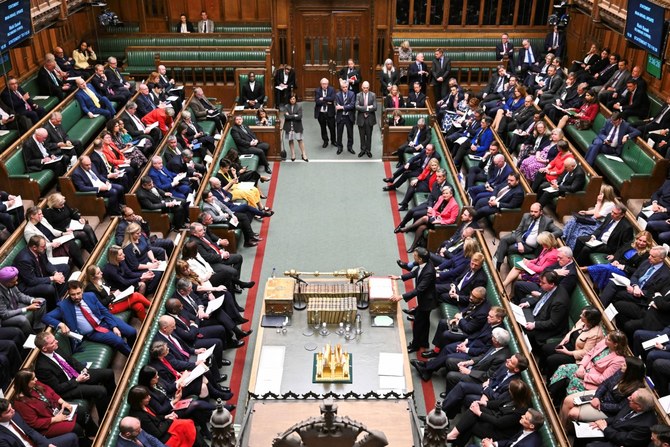
- 10B amendment seeks to exclude Afghan veterans from removal to Rwanda
- Top military officials warn of ‘grave damage to our ability to recruit local allies in future military operations’
London: Conservative MPs in the UK have voted against a plan to prevent Afghan veterans who served alongside British soldiers from facing deportation to Rwanda.
An amendment to the controversial Rwanda bill was overturned by 312 votes to 253 on Monday, in a rejection of plans to exempt agents, allies and employees of the UK from being deported to the African country, The Independent reported.
The House of Lords’ amendment 10B is part of the larger bill, which seeks the deportation of illegal migrants to Rwanda.
Several amendments set in the House of Lords have sought to prevent Afghan veterans who fought alongside the British military in the decade-long war from being included in deportation orders.
The 10B amendment included people eligible to enter the UK under the Afghan Relocations and Assistance Policy, which supports Afghans who helped the British campaign in their country and who are at risk under the Taliban government.
After the vote, the Rwanda bill will now return to the House of Lords for new scrutiny.
UK Prime Minister Rishi Sunak had told Conservative MPs to vote against all amendments to the bill, including 10B.
The move to exclude Afghan veterans from potential deportation to Rwanda has received support from the highest levels of Britain’s military establishment.
Thirteen senior military officials, two former chiefs of defense staff, a former defense secretary and a former UK ambassador to the US have supported the amendment.
The Sunday Telegraph carried a letter from top military officials ahead of Monday’s vote. They warned that a rejection of the amendment would cause “grave damage to our ability to recruit local allies in future military operations.”
The letter added: “It is essential that those who have made it to British shores are not unduly punished by being removed to Rwanda when the government’s scheme is up and running.”
India’s Lok Sabha election 2024: What you need to know
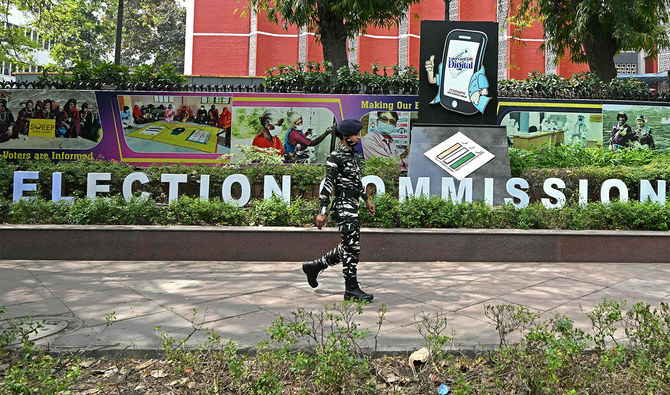
- India is holding the world’s biggest election starting this month, with nearly one billion people eligible to vote
- Votes to be counted on June 4 after polling done on April 19, April 26, May 7, May 13, May 20, May 25, June 1
India is holding the world’s biggest election starting this month, with nearly 1 billion people eligible to vote and Prime Minister Narendra Modi in the pole position.
WHAT IS IT?
Elections to the 543 contested seats in the lower house of parliament, called the Lok Sabha, for a term of five years. To rule, a party or a coalition needs a simple majority of 272 seats. Prime Minister Narendra Modi’s Bharatiya Janata Party (BJP) won 303 seats the last time, followed by 52 for the main opposition Indian National Congress (INC).
In addition to the contested seats, India’s president can nominate up to two Anglo-Indians to the Lok Sabha.
The Bharatiya Janata Party, BJP, won 303 seats in 2019 general election. The second largest party, the Indian National Congress, INC, won 52 seats. The Dravida Munnetra Kazhagam, DMK, emerged as the third largest party.
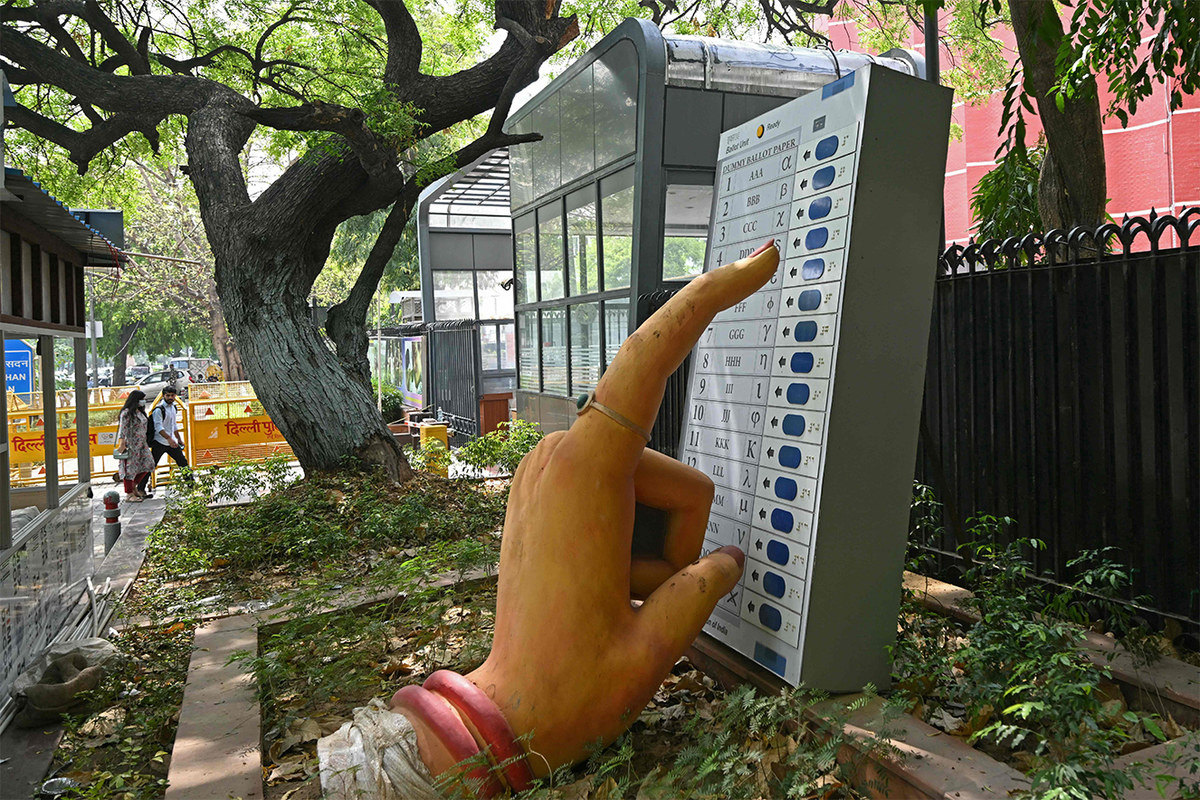
WHERE AND WHEN IS IT TAKING PLACE?
The elections will be conducted in seven phases partly to ensure sufficient security at polling booths across the vast country. Voters can make their choice by pressing a button on an electronic voting machine, first used in India in 1982 and more widely since the early 2000s.
Votes will be counted on June 4 after polling is done on April 19, April 26, May 7, May 13, May 20, May 25 and June 1.
The elections in the world’s largest democracy for 543 seats will be held in 7 phases.
HOW DOES IT WORK?
The world’s most populous nation follows the first-past-the-post system, where voters cast a vote for a single candidate in a constituency and the candidate with the most votes wins the seat. The voting age is 18 years and contestants need to be at least 25 years old.
A total of 968 million voters are registered, out of which 497 million are men and 471 million are women. A higher percentage of women voters than men are likely to vote for the second time in a row.
WHO ARE THE MAIN CANDIDATES?
Modi headlines the race, followed by his de facto deputy Amit Shah and the main opposition face, Rahul Gandhi of the Congress party. Gandhi’s mother Sonia, the matriarch of the Nehru-Gandhi dynasty, is not contesting this time.
WHY IS IT IMPORTANT?
Modi is chasing a record-equalling third straight term like India’s first prime minister, Jawaharlal Nehru. Modi says another overwhelming victory for the National Democratic Alliance, led by the BJP, is crucial to meet his goal of lifting India to a developed economy by 2047 from middle-income levels. The world’s fifth-largest economy has grown fast in the past few years and Modi has “guaranteed” to take it to the third position if he wins the election.
The BJP draws its support mainly from Hindus, who form 80 percent of the country’s 1.42 billion people and for whom Modi earlier this year delivered on a key party promise of building a grand Hindu temple on a disputed site.
The opposition “INDIA” alliance, largely a center-left grouping of more than two dozen disparate parties, says a victory for it is essential to save the country’s democratic and secular setup, lift its marginalized communities, raise prices for farmers and create jobs for its young. Opinion polls, which have a mixed record in India, predict another thrashing of the Congress alliance at the hands of the BJP.
US Treasury preparing new Iran sanctions after Israel attack, Axios reports
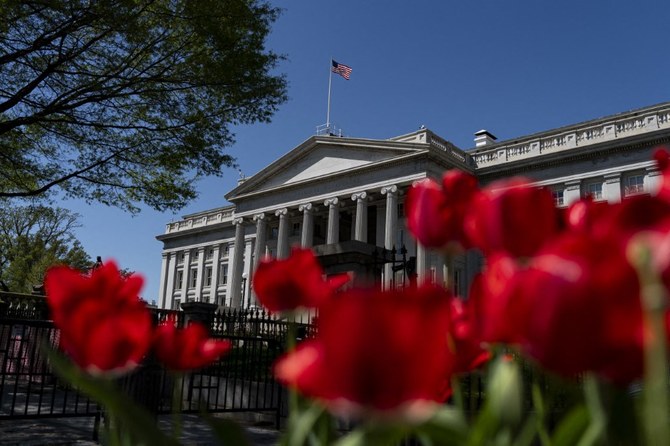
- Iran’s actions threatened stability in the Middle East and could cause economic spillovers
US Treasury Secretary Janet Yellen is preparing fresh sanctions on Iran in response to Iran’s attack on Israel, Axios reported on Tuesday, citing a copy of her remarks.
“Treasury will not hesitate to work with our allies to use our sanctions authority to continue disrupting the Iranian regime’s malign and destabilizing activity,” Yellen is prepared to say Tuesday, as per the Axios report.
“The attack by Iran and its proxies underscores the importance of Treasury’s work to use our economic tools to counter Iran’s malign activity,” she will further say, Axios reported.
Yellen said previously that Iran’s actions threatened stability in the Middle East and could cause economic spillovers, adding that the US would use sanctions and work with allies.
Afghanistan’s first female Olympian calls for Paris Games ban over Taliban’s rights record

- Friba Rezayee was 18 when she stepped onto the mat at 2004 Olympics in historic moment for her country
- Taliban say they respect women’s rights in line with their interpretation of Islamic law and local customs
GENEVA: Friba Rezayee, the first woman to represent Afghanistan at the Olympics, has been appalled by the treatment of women since the resurgence of the Taliban and is now campaigning for the country to be kept out of the Paris Games.
Rezayee, a judoka who competed at the 2004 Olympics in Athens, has called on the International Olympic Committee (IOC) to ban Afghanistan due to the Taliban’s human rights record. She has argued that under a such ban, Afghan women should still be allowed to participate as part of the IOC Refugee Olympic Team.
“Given tons and tons of evidence about the Taliban, about their brutal treatment of women and children, they are very dangerous,” Rezayee, who now lives in Vancouver, told Reuters.
“If the IOC allows them to enter the Olympics at the heart of Europe, in Paris in 2024, it’s very dangerous for the people.”
Zabihullah Mujahid, spokesman for the Taliban administration, declined to comment.
The Taliban — who say they respect women’s rights in line with their interpretation of Islamic law and local customs — have closed girls’ high schools and placed travel restrictions on women without a male guardian and restricted access to parks and gyms.
Asked to comment on Rezayee’s call, the IOC referred to a statement made last month by James Macleod, its Director of National Olympic Committee Relations and Olympic Solidarity.
Macleod said at the time that the IOC was in dialogue with Afghanistan’s National Olympic Committee (NOC) and sport authorities “with the aim to reverse the current restrictions on access to sport for women and young girls in Afghanistan.”
He said that although the IOC acknowledged different views on whether Afghanistan’s NOC should be suspended, it “doesn’t believe that isolation of the Afghan sporting community at this time is the right approach.”
Separately, the IOC said that athletes needed a refugee status confirmed by the United Nations refugee agency to be eligible for the IOC Refugee Olympic Team.
'STRONGER THAN MEN WITH GUNS'
Rezayee was 18 when she stepped onto the mat in Athens in a historic moment for her country. She was convinced her pioneering role would help advance women’s rights.
“I actually believed that we would only progress from here,” she said. “When I returned from Athens, I stayed in Afghanistan and I wanted to stay in Afghanistan. I continued my training because I saw the important changes it was making in every single girl’s life.”
But her hopes of seeing her countrywomen gain more rights were crushed when the Taliban seized power in August 2021.
“It feels like whatever I did to support women’s rights and gender equality back in 2004, it has been all undone by the IOC and by the Taliban and people who tolerate the Taliban,” Rezayee said.
In February, a United Nations expert described the Taliban’s disrespect for the rights of women and girls as “unparalleled in the world,” and said their takeover had “exacerbated a high prevalence of gender-based violence against women and girls.”
The IOC suspended Afghanistan’s NOC in 1999, and the country was barred from the 2000 Sydney Games. Afghanistan was reinstated after the fall of the Taliban, in time for Rezayee to compete in Athens.
Rezayee, who left Afghanistan in 2011 and settled in Canada, founded Women Leaders of Tomorrow, a non-profit that provides scholarships and education programs for Afghan women, including athletes.
The 38-year-old has received threats for her activism.
“I believe that my principles and the principles of human rights, women’s rights and women’s dignity are stronger than men with guns,” she said.



